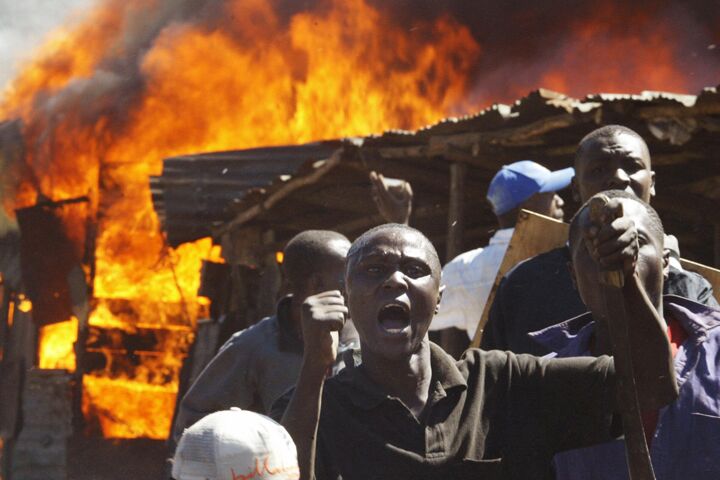
Kenya Burning Toward Civil War?
Burning buildings, blazing fires and violent clashes have filled streets across Kenya, and many areas are beginning to look like war zones, with armed soldiers and police combating protesters and ethnic violence claiming dozens of lives. The violence, which has left more than 200 dead so far, comes on the heels of hotly disputed presidential election results that declared President Mwai Kibaki the winner on Sunday.
Kibaki is suspected of rigging the election—the most hotly contested in Kenyan history—in order to stay in power for a second five-year term and defeat Raila Odinga, his chief opponent. U.S. officials, who initially accepted the results, have now said there were “serious problems experienced during the vote counting process,” “unrealistically high voter turnout,” and “apparent manipulation of some election reporting documents.”
Some districts reported 99, 100 and even 115 percent voter turnout.
Canada, Germany and the European Union, which monitored the elections, have also spoken out against the election results, calling for an investigation into the balloting.
Meanwhile, the slums of Nairobi and across the country are on fire as protesters burn shops and other buildings as well as vehicles and debris in the streets. The government has cracked down on rioters, and clashes with riot police have left many Kenyans beaten and shot, and some dead.
Much of the violence spiraling out of the election has been fueled by reignited ethnic hatreds. On Tuesday, dozens of people were burned to death inside a church by men from a different tribe. Elsewhere, mobs dragged people out of cars and lynched them if they happened to belong to the Kikuyu tribe. The Kikuyus, to which Kibaki belongs, are Kenya’s most privileged tribe, and rule the nation’s business and politics. In some cities, protesters have set up roadblocks between the Kikuyus and the Luos, to which Odinga belongs. Odinga has warned Kenya is ready to burst into civil war.
Odinga has declared victory himself and said Kibaki’s swearing-in was illegal. Plans by Odinga supporters to inaugurate him themselves on Monday were quashed by the government, but Odinga plans to hold the “people’s president” inauguration on Thursday regardless.
In spite of international pressure, the Kibaki administration continues to crack down hard to end the chaos, and law enforcement has shoot-to-kill authorization. Some reports indicate that a warrant has been issued for Odinga’s arrest.
Sadly, this chaos exploding in Kenya—the worst since the country’s independence from Britain in 1963, according to Time—far from being an African anomaly, comes as a result of the same governmental corruption and failure witnessed so often on that great continent. When Kibaki first came to power at the end of 2002, he was passionately welcomed by the masses—who turned out in the hundreds of thousands to cheer him at his swearing-in ceremony—as a reformer who would clean up the massive corruption of the previous government. His predecessor, Daniel arap Moi, had ruled for 24 years, gaining wealth and power for himself at the steep expense of his people.
Kenyan politics, according to Michael Holman of the Financial Times, “has been dominated by ethnic allegiances, stained by assassination, distorted by one-party rule until 1991 and, above all, oiled by endemic corruption” (January 1). Needless to say, none of that changed under Kibaki. A short five years later, the hoped-for reformer is seen as just another Big Man of Africa—sworn into office Sunday with only a handful of party loyalists there to support him.
Tyranny, corruption and economic deprivation have been rife in Africa since the 1950s, largely as a result of failed government. When so-called reformers have come on the scene in different countries, the political system has quickly reverted to form. What is the solution? To find out the lasting solution to Africa’s seemingly endless government disasters, read “The Big Men” and Mystery of the Ages.
